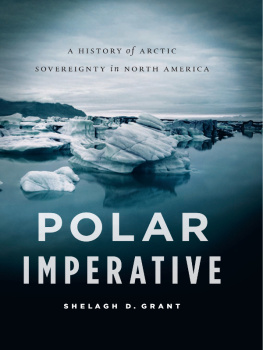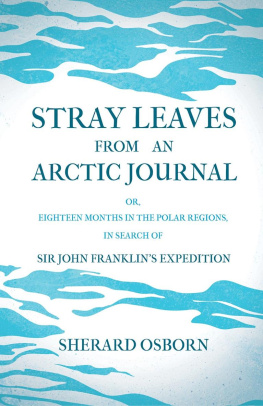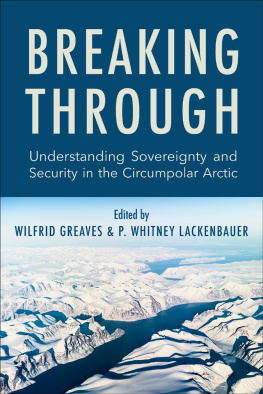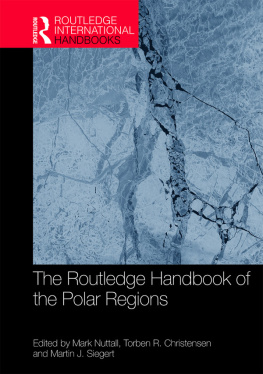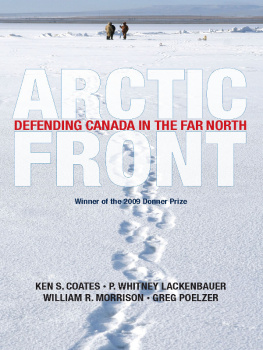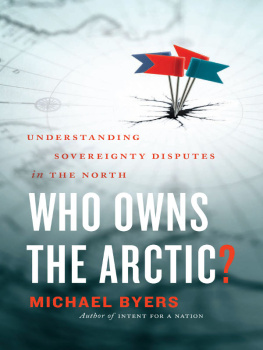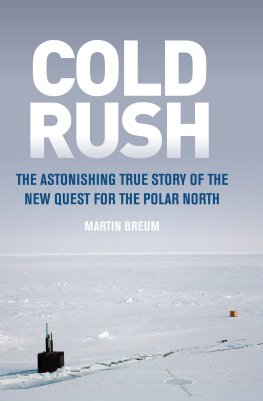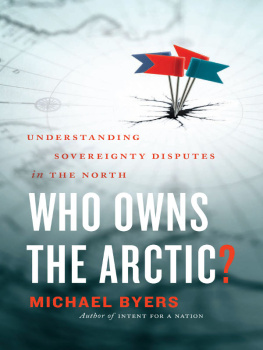POLAR IMPERATIVE
POLAR
A HISTORY of ARCTIC
SOVEREIGNTY in NORTH AMERICA
IMPERATIVE
SHELAGH D. GRANT

DOUGLAS & MCINTYRE
D&M PUBLISHERS INC.
Vancouver/Toronto/Berkeley
Copyright 2010 by Shelagh Grant
All rights reserved. No part of this book may be reproduced, stored in a retrieval system or transmitted, in any form or by any means, without the prior written consent of the publisher or a licence from The Canadian Copyright Licensing Agency (Access Copyright). For a copyright licence, visit www.accesscopyright.ca or call toll free to 1-800-893-5777.
Douglas & McIntyre
An imprint of D&M Publishers Inc.
2323 Quebec Street, Suite 201
Vancouver BC Canada V5T 4S7
www.douglas-mcintyre.com
Cataloguing data available from Library and Archives Canada
ISBN 978-1-55365-418-6 (cloth)
ISBN 978-1-55365-618-0 (ebook)
Editing by Jean Wilson
Jacket photograph Bergy Bits under Cloudy Sky Corbis
Distributed in the U.S. by Publishers Group West
We gratefully acknowledge the financial support of the Canada Council for the Arts, the British Columbia Arts Council, the Province of British Columbia through the Book Publishing Tax Credit and the Government of Canada through the Canada Book Fund for our publishing activities.
For Jon,
my children and grandchildren
CONTENTS


PREFACE AND
ACKNOWLEDGEMENTS

I NSPIRATION COMES unexpectedly and often in the strangest places. I always knew I would write this book but never quite understood why, until a visit in the summer of 2006 to the abandoned RCMP detachment at Dundas Harbour not far from the eastern entrance to the Northwest Passage.
Jon and I, along with our fourteen-year-old grandson, had just debarked from a Zodiac and climbed up a rocky incline. It was warm and sunny, the skies a vibrant azure blue and not an animal to be seen. When we reached the top of the hill, the sight before us was breathtaking: three tiny boxes set slightly apart on a vast landscape of green tundra, pebble beach and glistening waters that stretched endlessly to the horizon. Behind lay towering cliffs and nestled on the side, a white picket fence that I knew enclosed the graves of two police officers. The compelling beauty of the scene slowly gave way to one of incomprehension. How could three young men assisted by two Greenlandic Inuit families possibly protect Canadian sovereignty in this remote and barren land, which had never been occupied by Inuit and rarely, if ever, been visited by hunting parties? Even the whalers had long departed. With a small wooden skiff and rifles used for hunting, how could they do anything of greater significance than raising a flag on Beechey Island? Was it just symbolic? Perhaps a deterrent?
The Canadian plan to maintain sovereignty in the High Arctic was predicated on the legal requirement to show effective occupation. But why and to what purpose were they carrying out such administrative tasks as operating a post office, taking a census and making regular reports on wildlife resources and routine sled patrols? The Greenlanders had supplied the dog teams and sleds. And we all know that the young policemen could not have survived without them. Was it some sort of paper sovereignty designed to fulfill the legal requirements?
Admittedly, more southerly detachments like Pond Inlet, Pangnirtung and Lake Harbour served nearby Inuit camps. But unlike the Danes in Greenland, the Canadian government made no attempt to provide them with an education or medical services, at least until they were shamed into doing so thirty-odd years later following reports by American airmen who served in the Canadian Arctic during World War II. Why was the United States and Danish treatment of their Inuit so different?
The rationale behind the establishment of the High Arctic police posts continued to haunt me. Was it simply a matter of national pride? Perhaps inspired by another country wanting the land? Or was it just the least costly means to maintain sovereigntylike cats marking their territory? These were hard questions and the answers lay in British, Canadian, American and Danish history.
Global warming has once again brought the Arctic and related sovereignty questions to the forefront of public attention. Yet there is something unsettling in the current discourse that at times resembles a hodgepodge of facts and opinions, akin to pieces of a patchwork quilt waiting to be incorporated into the finished product. It was time to put the pieces together, fill in the gaps and provide the context to complete the story. I now knew why I was writing the book and it was time to think outside the box.
For the most part, major Canadian studies on Arctic sovereignty have tended to focus on legal interpretations and potential challenges, but with only a cursory review of circumpolar history. PolarImperative takes a much different approach, initially by narrowing the parameters of the study to exclude the Subarctic, then adopting a comparative platform to broaden the scope by encompassing all of the North American Arctic, including Alaska and Greenland, and finally by extending back over thousands of years to identify circumstances and events that influenced changes in occupation or authority. Where pertinent, the inquiry touches on parallel situations in the European and Russian Arctic to establish a global context for changes taking place. This book also explores the human dimension to show how the vision and commitment of various individuals had a major impact on government actions. Only through understanding the history of all three Arctic countries can we fully comprehend the implications of the current situation.
My personal attraction to the Arctic began further south, with an enduring childhood love of the northern wilderness experienced first-hand through camping and canoeing. Inevitably my vision of north moved further north until academic research led me to the Arctic, my own personal ultima Thule. Thus it was as a student of history, rather than of political science or law, that my curiosity raised questions about Arctic sovereignty: who? when? why and where? Interest naturally broadened with travels across Arctic Canada, to Greenland, the Svalbard Islands and central Siberia, even to a Saami reindeer farm in northern Finland. In Greenland, I visited remote west coast fishing villages, research stations at Meistervig and Station Nord, as well as the U.S. air base at Thule.
Researching this book dominated much of my time for the last thirty years, beginning with a graduate thesis on Canadas northern policies during and after World War II. Subsequent research in Washington and London broadened the inquiry and led to the publication of Sovereignty or Security? Government Policy in the Canadian North, 19391950. My archival research continued, backwards and forwards of the original timeline, but still focussing on sovereignty-related issues.
Teaching in the Canadian Studies Program at Trent University inspired a more interdisciplinary and comparative approach to my inquiries, leading to a number of papers on circumpolar relationships and presentations at international conferences in Russian Siberia, Scotland and Iceland. I also had first-hand experience in writing comparative history as co-editor and contributor for a collection of essays,
Next page
